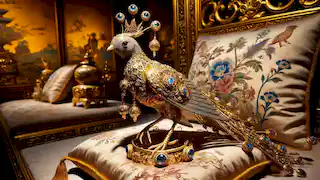The Nightingale
Reading Time: 9 min

About Story: The Nightingale is a Fairy Tale from china set in the Ancient. This Poetic tale explores themes of Wisdom and is suitable for All Ages. It offers Moral insights. A tale of true beauty and wisdom beyond the superficial.
The Emperor's Palace and the Enchanted Forest
In a faraway kingdom, the Emperor of China resided in a palace of unparalleled splendor. The palace, crafted entirely of the finest porcelain, was a masterpiece of delicate beauty. Each piece was so fragile that it could shatter with a mere breath, yet it stood majestically amidst a garden filled with the rarest flowers and most exquisite plants. The garden was a paradise on earth, filled with the sweetest scents and vibrant colors that changed with the seasons. Beyond this garden lay an enchanted forest, a place shrouded in mystery and wonder.
The emperor, known for his love of beauty and perfection, took great pride in his palace and garden. However, he had never ventured into the deep forest that bordered his realm, believing that nothing could surpass the beauty of his domain. The forest was said to be home to many mysterious creatures, and among them was a nightingale whose song was so enchanting that it was said to make even the hardest hearts weep.

One day, the emperor's court was abuzz with tales of this nightingale. A traveler, having heard the bird's song, described it as the most beautiful music he had ever encountered. The emperor, curious and somewhat skeptical, was surprised that he had never heard of this bird before. He demanded to hear the nightingale for himself and ordered his courtiers to find it and bring it to him.
The courtiers, along with the emperor's most learned scholars and musicians, set out to find the nightingale. They searched the palace gardens and the edge of the forest but found nothing. Finally, they encountered a humble kitchen maid who often ventured into the forest to gather herbs. She knew the bird well and led the party deep into the forest, to a small grove where the nightingale sang.
The courtiers were stunned by the nightingale's simple appearance, for it was an ordinary-looking bird. However, when it began to sing, its voice was nothing short of miraculous. The song was filled with a depth of emotion and beauty that moved everyone who heard it. The courtiers, realizing the bird's extraordinary talent, immediately brought it to the emperor.
The Nightingale's Song
When the nightingale was presented to the emperor, he was initially unimpressed by its plain appearance. However, as soon as the bird began to sing, the emperor was captivated. The nightingale's song was pure and resonant, filled with a range of emotions from sorrow to joy. It spoke of the beauty of nature, the passing of seasons, and the simple pleasures of life.
The emperor, deeply moved, ordered that the nightingale be placed in a golden cage within the palace so he could listen to its song whenever he wished. The bird sang each day, bringing joy and solace to the emperor and all who heard it. The courtiers, too, found comfort in the bird's song, and it became a daily ritual to listen to its melodies.
As the days passed, the fame of the nightingale's song spread throughout the kingdom and beyond. People came from distant lands to hear the nightingale, and the emperor's court became a place of pilgrimage for lovers of music and beauty. The emperor, proud of his possession, showered the bird with praise and gifts. He even offered the nightingale a position at court, naming it the "Chief Songbird of the Realm."
However, the nightingale, though honored, longed for the freedom of the forest. It missed the cool shade of the trees, the rustling of leaves, and the natural rhythm of life outside the palace walls. Despite the luxurious cage and the adoration of the court, the bird felt a growing sadness.
The Arrival of the Artificial Bird
One day, the emperor received a gift from the Emperor of Japan. It was an artificial nightingale, crafted from gold and encrusted with precious jewels. The mechanical bird was a marvel of engineering; it could sing at the touch of a button, its melody perfect and unchanging. The emperor and his court were amazed by the artificial bird's appearance and flawless song. It glittered and shone, a stark contrast to the real nightingale's simple beauty.
The emperor, fascinated by the mechanical bird, began to favor it over the real nightingale. He was impressed by the artificial bird's ability to sing the same song over and over without tiring, and he admired its sparkling jewels. The real nightingale's song, with its variations and nuances, seemed unpredictable and less controllable by comparison.
The emperor ordered that the artificial bird be placed on a silk cushion beside his bed so he could listen to its song whenever he desired. The real nightingale, feeling neglected and unappreciated, became sad. Despite the admiration of the court, it sensed that its natural, heartfelt song was no longer valued. One day, the bird flew out of the palace window and returned to the freedom of the forest. The court was so engrossed in the artificial bird's performance that they hardly noticed the nightingale's departure.

The Emperor's Illness and the Nightingale's Return
Time passed, and the novelty of the artificial bird began to wear off. Although it could sing the same song perfectly, the lack of variation made the melody monotonous. The emperor, who had grown accustomed to the artificial bird's song, found it increasingly less satisfying. Meanwhile, the courtiers and the people of the court longed for the emotional depth and variety of the real nightingale's song.
The emperor, realizing too late the value of the nightingale's natural music, fell into a deep melancholy. His health began to decline, and no medicine or doctor could cure him. The once vibrant and joyous court became a place of gloom and sorrow. The emperor, bedridden and weak, longed for the soothing song of the real nightingale, but it was nowhere to be found.
One night, as the emperor lay on his deathbed, he heard a faint, sweet melody drifting through the open window. It was the real nightingale, who had heard of the emperor's plight and returned to sing for him. The bird's song was filled with a mixture of sorrow and hope, telling of the beauty of life and the peace of death. The emperor, listening to the nightingale's song, felt a wave of emotion wash over him. He realized that the bird's music was a reflection of the natural world's true beauty, something that could not be replicated by any artificial creation.

The nightingale's song revitalized the emperor, bringing him back from the brink of death. He felt a newfound appreciation for the simple, natural things in life. The emperor asked the nightingale to stay and sing for him, promising that it would be free to come and go as it pleased. The nightingale agreed, on the condition that it would not be caged and that it would be allowed to live in the forest as it had before.
The Nightingale's Freedom and the Emperor's Transformation
The emperor, grateful for the nightingale's gift of song and life, honored the bird's request. He decreed that the nightingale should be free to fly wherever it wished and that it would always have a place in the palace garden. The emperor's courtiers and the people of the court rejoiced at the return of the nightingale, and the palace once again became a place of joy and music.
The nightingale continued to sing for the emperor, who listened with a new understanding and appreciation. The bird's song spoke of the changing seasons, the beauty of the natural world, and the fleeting nature of life. The emperor, who had once been obsessed with material wealth and superficial beauty, became a wiser and more compassionate ruler. He realized that true happiness could not be found in artificial luxuries but in the simple, natural joys of life.
The emperor's transformation had a profound effect on his rule. He became more generous and caring, focusing on the well-being of his people and the preservation of the natural world. The emperor ordered that the palace gardens be expanded and filled with more flowers and plants, creating a sanctuary for the nightingale and other creatures. He also decreed that the artificial bird be placed in a museum as a reminder of the folly of placing too much value on superficial appearances.

The Nightingale's Legacy
Years passed, and the emperor grew old, but he never forgot the lessons he had learned from the nightingale's song. The bird continued to visit the palace, singing its beautiful melodies and bringing joy to all who heard it. The emperor's children and grandchildren grew up listening to the nightingale, and the bird's music became an integral part of their lives.
The story of the nightingale and the emperor became a beloved legend in the kingdom. The nightingale was celebrated not only for its beautiful voice but also for the wisdom it imparted. It taught the importance of appreciating the simple, natural things in life and the value of true art and beauty. The nightingale's song became a symbol of the harmony between nature and the human soul, a timeless message that resonated with people of all ages.
The emperor, on his deathbed, was once again visited by the nightingale. The bird sang a final, heartfelt song, a farewell filled with gratitude and love. The emperor, surrounded by his family and courtiers, listened with a peaceful heart. He knew that he had lived a full life, enriched by the nightingale's song and the lessons it had taught him.
After the emperor's passing, the new ruler continued to honor the nightingale and its legacy. The bird was allowed to live freely in the palace garden and the surrounding forest, a cherished and protected creature. The nightingale's song continued to echo through the kingdom, a reminder of the beauty
and wisdom of the natural world.
The artificial bird, once a prized possession, became a relic of the past, admired for its craftsmanship but overshadowed by the real nightingale's timeless song. The people of the kingdom learned to value the true and natural over the artificial and superficial, a lesson that was passed down through generations.

And so, the nightingale continued to sing, its melodies a gift to all who listened. Its song, filled with the essence of life and nature, brought joy, comfort, and wisdom to the people. The legend of the nightingale lived on, a testament to the enduring power of true beauty and the simple joys of life.

















